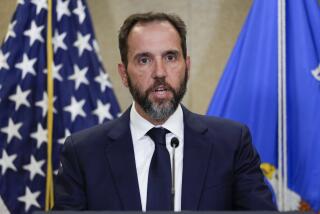Meese Extends Special Counsels Act to Congress
- Share via
WASHINGTON — In a move that was widely viewed as a parting shot at congressional critics just hours before he left office, outgoing Atty. Gen. Edwin Meese III on Friday announced the establishment of a new system of “special counsels” to investigate wrongdoing by members of Congress.
The departing attorney general told a farewell news conference that Richard L. Thornburgh, who was sworn in to succeed him at a White House ceremony shortly after Meese’s announcement, had endorsed the idea of setting up a new procedure for investigating senators and congressmen.
Meese, who was the target of two investigations by independent counsels during his seven years in the Reagan Administration, said the new procedure would subject Congress to the same rules it imposed on the executive branch. He said he had accomplished this by departmental order because Congress had refused to include itself under the 1978 Ethics in Government Act.
Seen as Vengeful
But Rep. Barney Frank (D-Mass.), an outspoken advocate of governmental ethics, said: “Meese had the authority to set up special counsels since the day he became attorney general. Why does he wait till his last day? He’s doing this out of his bitterness and vengefulness.”
Sen. Carl Levin (D-Mich.), who has sponsored legislation to update the Ethics in Government Act, said: “It is fine to have special counsels investigate members of Congress, but Meese long has had that option available to him.”
Meese denied a reporter’s suggestion that he wanted to give Congress “a dose of its own medicine” with his new directive on special counsels. “I think that having all high officials covered by the same general procedures makes good sense,” he said.
He added that the new system would assure the public that an investigation was not based on political considerations. Meese said any continuing investigations would not fall under the new rules, such as the House Ethics Committee’s inquiry into the financial affairs of House Speaker Jim Wright (D-Tex.).
Under the procedure, Meese said, the FBI will have 90 days to conduct a “preliminary inquiry” if the attorney general receives specific allegations involving a member of Congress. If the initial inquiry turns up substantial evidence of a crime, the attorney general then will appoint an independent, special counsel to conduct a full investigation.
Thornburgh, when asked at his oath-taking ceremony if Meese had discussed the new order with him, replied: “He informed me that he was going to issue it, yes.”
He declined, however, to answer questions about Meese’s tenure at the Justice Department, saying: “I much prefer to look forward rather than backward. I’ll let others make judgments about the past.”
Thornburgh, who served two terms as governor of Pennsylvania, headed the Justice Department’s Criminal Division during the Gerald R. Ford Administration.
‘You’re Just the Man’
President Reagan told Thornburgh that “you’re just the man I want taking the helm . . . at this critical time,” noting that the new attorney general had “fought for integrity in government” and will continue the department’s pursuit of drug traffickers and organized crime leaders.
Meese left office under a plan he announced a month ago after independent counsel James C. McKay completed a 14-month investigation of his conduct, including his association with longtime friend and former attorney, E. Robert Wallach. Although McKay sharply criticized Meese’s conduct, the attorney general said he had been “vindicated” because no indictment was sought.
When reminded he had attacked McKay for opinions expressed in his report, Meese told reporters that he endorsed the idea of independent inquiries if properly conducted. He said McKay had overstepped his authority, however, in stating that Meese “probably” had violated tax laws and conflict-of-interest provisions.
Feels No Shame
Meese, who will take positions with the Hoover Institution at Stanford University and with the Heritage Foundation, a conservative Washington think tank, said he had nothing to be ashamed of. “I believe my conduct has been totally proper, ethical and legal,” he said.
Department officials, meanwhile, said that Meese’s chief of staff, Mark Levin, departed earlier this week and that another top aide, Joseph Morris, will be leaving for a job in private industry.
However, William Bradford Reynolds, assistant attorney general for civil rights and counselor to Meese, is planning to remain in the department pending discussions with Thornburgh, officials said.
More to Read
Get the L.A. Times Politics newsletter
Deeply reported insights into legislation, politics and policy from Sacramento, Washington and beyond. In your inbox twice per week.
You may occasionally receive promotional content from the Los Angeles Times.










